Chief of the Cabinet of Ministers
| Chief of the Cabinet of Ministers of Argentina
Jefe de Gabinete de Ministros de la Nación Argentina | |
|---|---|
| Appointer | President of Argentina |
| Inaugural holder | Eduardo Bauzá |
| Formation | 1995 |
| Website | Official site |
The Chief of the Cabinet of Ministers (Spanish: Jefe del Gabinete de Ministros de la Nación Argentina) is a political office of Argentina, akin to a prime minister, created by the 1994 amendment of the Argentine Constitution. The current office holder is Marcos Peña, who serves in President Mauricio Macri's cabinet.
Attributions
The attributions of the Chief of the Cabinet of Ministers are established by the articles 100 and 101 of the Constitution of Argentina. Most of his duties are related to organize the work of the other Ministers, or to its intermediary role between the Executive Power and the Argentine National Congress.
To detail in full the powers and duties of the Chief of the Cabinet of Ministers of Argentina under Articles 100 and 101 of the Constitution to quote:
"Second Part: Authorities of the Nation Chapter IV
The Chief of the Ministerial Cabinet and other Ministers of the Executive Power
Section 100.- The Chief of the Ministerial Cabinet and the other secretary ministers, whose number and powers shall be determined by a special law, shall be in charge of the business of the Nation and shall countersign and legalize the acts of the President with their signatures, without which said acts are void.
The Chief of the Ministerial Cabinet, politically liable before the National Congress, is empowered:
1.- To exercise the general administration of the country.
2.- To perform the acts and issue the rules necessary to exercise the powers granted by this section as well as those delegated by the President of the Nation, being countersigned by the pertinent secretary minister to which the act or rule refers.
3.- To appoint the employees of the Administration, except for those pertaining to the President.
4.- To exercise the functions and powers delegated to him by the President of the Nation and, with the consent of the Cabinet, to decide about matters that the Executive Power may indicate to him or, on his own account, about those he deems it necessary due to their importance, within the scope of his jurisdiction.
5.- To coordinate, prepare and convoke the meetings of the ministerial cabinet, presiding at them in the absence of the President.
6.- To submit to Congress the bills on Ministries and National Budget, with the prior consent of the Cabinet and the approval of the Executive Power.
7.- To have the revenues of the Nation collected and to enforce the National Budget Act.
8.- To countersign regulatory decrees of the laws, decrees to extend the ordinary legislative session of Congress or to convoke to an extraordinary one, and the messages of the President supporting legislative initiatives.
9.- To attend the meetings of Congress and take part in its debates, but not to vote.
10.- Once the ordinary legislative session of Congress has begun, to submit together with the other ministers a detailed report on the state of the Nation regarding the business of the respective departments.
11.- To give such oral and written reports and explanations that either of the Houses may request from the Executive Power.
12.- To countersign decrees about powers delegated by Congress, which shall be under the control of the Joint Standing Committee.
13.- To countersign, together with the other ministers, decrees of necessity and urgency and decrees on partial promulgation of laws. Within ten days of their approval, he shall personally submit these decrees to the consideration of the Joint Standing Committee.
The Chief of the Ministerial Cabinet shall not be simultaneously appointed to another ministry.
Section 101.- The Chief of the Ministerial Cabinet shall attend Congress at least once a month, alternating between each House, to report on the progress of the government, notwithstanding the provisions of Section 71. He may be interpellated for the purpose of considering a vote of censure, by the vote of the absolute majority of all the members of either House, and he may be removed by the vote of the absolute majority of the members of each House."[1]
List of Chiefs of the Cabinet of Ministers
| President | # | Portrait | Name | Term of office | Political Party | |
|---|---|---|---|---|---|---|
| Carlos Menem | 1 | 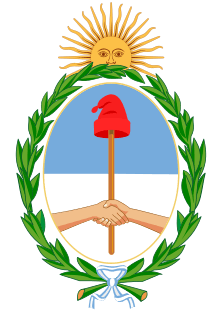 |
Eduardo Bauzá | 8 July 1995 | 5 June 1996 | Justicialist Party |
| 2 |  |
Jorge Alberto Rodríguez | 5 June 1996 | 10 December 1999 | Justicialist Party | |
| Fernando de la Rúa | 3 |  |
Rodolfo Terragno | 10 December 1999 | 6 October 2000 | Radical Civic Union |
| 4 |  |
Chrystian Colombo | 6 October 2000 | 20 December 2001 | Radical Civic Union | |
| Ramón Puerta | 5 |  |
Humberto Schiavoni | 20 December 2001 | 23 December 2001 | Justicialist Party |
| Adolfo Rodríguez Saá | 6 | 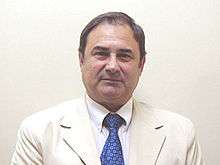 |
Luis Lusquiños | 23 December 2001 | 30 December 2001 | Justicialist Party |
| Eduardo Camaño | 7 | 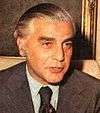 |
Antonio Cafiero | 30 December 2001 | 2 January 2002 | Justicialist Party |
| Eduardo Duhalde | 8 | 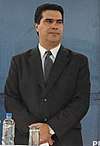 |
Jorge Capitanich | 2 January 2002 | 3 May 2002 | Justicialist Party |
| 9 |  |
Alfredo Atanasof | 3 May 2002 | 25 May 2003 | Justicialist Party | |
| Néstor Kirchner | 10 |  |
Alberto Ángel Fernández | 25 May 2003 | 23 July 2008 | Justicialist Party |
| Cristina Fernández de Kirchner | ||||||
| 11 | .jpg) |
Sergio Massa | 23 July 2008 | 7 July 2009 | Justicialist Party | |
| 12 | .jpg) |
Aníbal Fernández | 7 July 2009 | 10 December 2011 | Justicialist Party | |
| 13 | 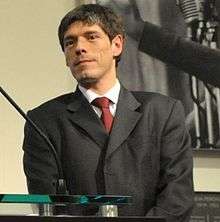 |
Juan Manuel Abal Medina | 10 December 2011 | 20 December 2013 | Justicialist Party | |
| 14 |  |
Jorge Capitanich | 20 December 2013 | 26 February 2015 | Justicialist Party | |
| 15 | .jpg) |
Aníbal Fernández | 26 February 2015 | 10 December 2015 | Justicialist Party | |
| Mauricio Macri | 16 | .jpg) |
Marcos Peña | 10 December 2015 | present | Republican Proposal |
References
- ↑ "Congreso de la Nación Argentina". Congress of the Argentine Nation. Retrieved 19 September 2018.

External links
https://www.congreso.gob.ar/constitucionSeccion2Cap4_ingles.php